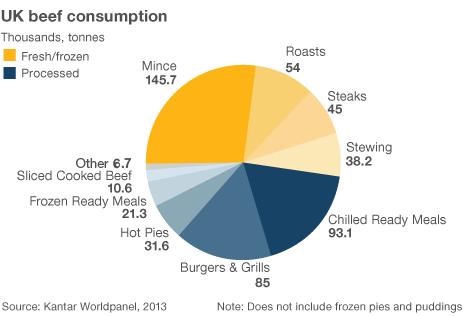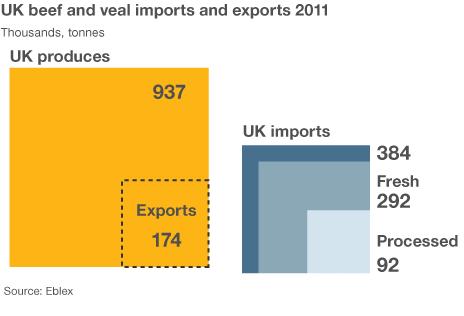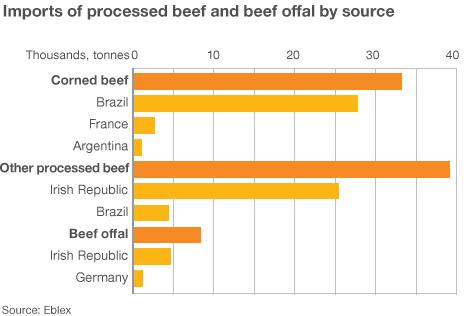Horsemeat scandal: 'Tougher testing' by retailers ordered
- Published
Environment Secretary Owen Paterson: "There may well be more bad news"
Retailers have agreed to carry out "more and tougher testing" of beef products in the wake of widespread horsemeat contamination, the environment secretary says.
Test results will be published every three months by the Food Standards Agency, Owen Paterson said.
He said the presence of horsemeat was due to "incompetence" or an international criminal "conspiracy".
And he added "more bad news" could come from test results due on Friday.
Aldi and Findus withdrew products days ago, while Tesco, Iceland and Lidl acted last month.
Mr Paterson met retailers, food producer groups and the Food Standards Agency on Saturday to ask how "beef" products containing up to 100% horsemeat were sold.
He said he hoped for "meaningful results" on Friday from tests ordered on all processed beef products.
And he said it was "totally unacceptable" that horsemeat had been found in "beef".
"There has either been gross incompetence in some of these cases or a criminal international conspiracy.
"We are completely determined, all of us, to get to the bottom of this."
The environment secretary said he wants to see more testing within the existing regime.
"People should have absolute confidence in what they are buying. The responsibility for that lies with the retailers, who need to be absolutely sure that what they're selling is what they think it is."
The FSA has said it was "highly likely" criminal activity was to blame for the contamination, while the Met Police has said it will not launch an investigation "unless it becomes clear there has been any criminality".
Morrisons boss Dalton Philips, speaking outside the Department for Environment, Food and Rural Affairs before the meeting, said the supply chain had become "far too complex".
"There is a role for testing and we're very supportive of the testing regime but it's a moment in time," he said.
Anne McIntosh MP: "Absolutely no problem with British meat - it's traceable, it's farm-assured"
"The truth is you've got to know your farmer, you've got to know where your meat's being processed."
Labour leader Ed Miliband said that, "after the immediate issues, we need to understand how it happened and what needs doing to ensure it doesn't happen again".
Meanwhile, it has emerged that Findus knew about horsemeat in its products for a week before it told the FSA.
The company has admitted that test results from 29 January showed traces of horsemeat in its beef products.
At that point, it stopped taking the products from French supplier Comigel and stopped sending them to retailers.
More thorough testing was carried out - including the DNA testing of raw material at Comigel's factory - and the results were confirmed on Wednesday. The FSA was informed that same day.
The head of Findus France has said the company believes it was defrauded and will bring legal proceedings in the French courts on Monday.
The French anti-fraud office has begun investigating the complex Europe-wide chain of instructions for ordering ready-meals from Comigel, which links France, Luxembourg, Cyprus, the Netherlands and Romania.
Findus UK issued a statement: "The early results from Findus UK's internal investigation strongly suggests that the horsemeat contamination in beef lasagne was not accidental."
Meanwhile, the French company Spanghero, which sold horsemeat to the company that made the ready meals, alleged it in turn had been defrauded by its supplier.
'Let people down'
"The meat was labelled beef," said Barthelemy Aguerre, company president, adding that Spanghero would sue.
The FSA said Findus had tested the meat in 18 of its beef lasagne products and found 11 meals in which it contained between 60% and 100% horsemeat.
Findus has taken out space in a number of national newspapers, in which it updates customers and says it is "sorry that we have let people down", external.
Responding to newspaper reports that the company was aware of problems last year, Findus said in a statement: "Findus want to be absolutely explicit that they were not aware of any issue of contamination with horsemeat last year."
The controversy surrounding contamination of meat products has also affected firms in the UK, Irish Republic, Poland and France.
Last month, Irish food inspectors announced they had found horsemeat in some burgers stocked by a number of UK supermarket chains, including Tesco, Iceland and Lidl.

Between fresh and processed, the UK consumes more fresh or frozen beef.

The UK still produces and consumes more of its own beef than it imports

Ireland and Brazil are major suppliers of the UK's imported processed beef
- Published8 February 2013
- Published8 February 2013
- Published19 January 2013
- Published10 April 2013
- Published8 February 2013
- Published18 January 2013